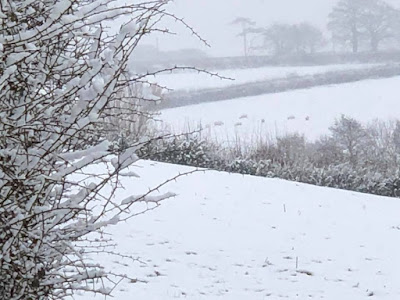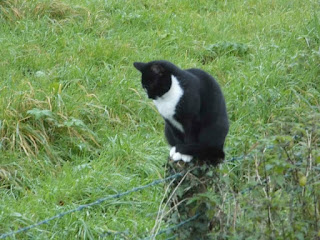As an
author, my great loves are reading and writing.
But my favourite hobby is time-travelling. I might as well confess now.
After all, time-travel is not only a hobby, it is a necessary part of my life.
My
Tardis is a good deal more conventional than Doctor Who’s. It certainly doesn’t
look like a police phone box, indeed it looks exactly like my study. The walls
are completely covered by book shelves and paintings, the books are crammed
into every corner, and there is a very large desk covered in papers, pens,
magnifying glasses, books and notebooks, curios and ornaments, and a very large
computer screen.
I also
have a swivel chair pulled up to the desk, plus a large comfy armchair in the
corner. The last details are a number of overflowing wastepaper baskets, and a
stereo CD player with all its speakers.
Tidy?
Certainly not. It’s a Tardis after all, and not a neat little modern box.
I sit
comfortably, close my eyes, and open them again five hundred years ago. London is darker and quieter, no engines
rattle, no machines roar, no cars screech around the street corners, no traffic
jams clog the roads. But two men on horseback gallop by, the feathers in their
hats blowing in the wind, and their velvet capes swirling out behind them. The
people in the narrow cobbled street run to either side, for there is little
space and no pavements. Not all streets are cobbled and many are simply beaten
earth, while the gutters are central and filled with rancid water and rubbish.
Without
electricity of any kind apart from thunder and lightning, most people rise with
the sun, and in summer they go to bed with the sunset. In winter’s evenings,
some will light candles, but not all can afford such luxury. Even tallow
candles cost money, and more are bought for church than for homes. But a fire
will usually be lit on the hearth, which is still sometimes a central hearth
since chimneys are quite a new and luxurious idea, and the scarlet flames bring
light.
Few
homes have glass in their windows. Windows may be covered in parchments, thin
bone, or cloth. Shop windows are usually boarded up at night, but the wooden
board will be taken down during the day, and laid on the window sill as a
counter. Only the rich and the churches have access to glass., although
gradually over the years the mullioned windows are closed with small glass
panes as this becomes more economically accessible.
Most
homes are built from wood, straw and plaster (Wattle and Daub). Their upper
floors are built out with a larger floor space than the one below. This brings
balance, although if not properly done, which is often the truth, then the
whole building bulges outwards and some houses almost touch their upper stories
across the road below. Inside there is a simplicity of rooms and design, with
little furniture and virtually no privacy. Thatched roofs still exist although
they are now illegal due to the danger of fire, but tiled rooves are gradually
more common.
There was
a clash of authority, and many modern misconceptions are rife concerning this. The
king, whoever he was, could not just frown and immediately all the lords leapt
to their feet to do as he wished. Those who believe Richard III managed to
influence the three houses of parliament with a simple sneer, are sadly
ignorant of the facts. Indeed, many of the lords were more powerful than the
king himself, could also dominate the court, and had enormous armies. Such a
powerful lord, and there were many, could dominate the king and even force him
to abdicate, as happened on occasion. In fact, the king had no private army at
all, although he could call on his friends if he had the time to do so. Power
throughout the land was widely divided and urban authorities, High Constables
and the rich were frequently in command. Indeed, the church was far more dominant
than it is today. Certainly there was no religious tolerance and no other form
except Catholicism was permitted in England. However, although weekly
attendance at church was common, total obedience to the ecclesiastical rules
and demands was definitely not. The moral standards were not accepted by all,
the priests continually complained that the community was licentious and full
of wicked sinners, and the community complained that the church was greedy and
sinful themselves.
Other modern
misconceptions abound. Women were certainly dominated and often abused, but
they also ran their own businesses, behaved as they wished to a considerable
degree (chastity belts never existed and no woman in England was ever burned
alive as a witch) while many women from queens downward fought, schemed and
ruled the household.
Another
thing that did not exist was a decent method of sewerage destruction, although
sewerage tanks were built and buried, but most was drained directly into the
moat, the river, or the ditches outside the city walls. The smell echoed this
difficulty.
The
Thames and other major rivers are busy with water-taxis, the calls of the
boatmen, small boats carrying goods and even horses, and even busier ports
where boats of all sizes docked for unloading. There were few bridges – only
one over the Thames in London for instance – and this could be locked at night.
Indeed, most cities lay within high stone walls bringing protection against
invasion, and the gates would be closed at a certain time, denying access to
all.
And so I
travel by Tardis, especially to the 15th century but also both
earlier and later, and therefore I escape the mundane housecleaning, cooking,
shopping and boring routines while I explore the past.
It is a
pastime I recommend, since it is only once you stand there, gazing around at
such a different word, once you smell the city, hear the church bells, and
watch the habits of the people that you begin to really know you are there and
can write about what surrounds you.
About Barbara
Barbara Gaskell Denvil is a multi-award winning author of historical fiction, mystery, suspense and fantasy. Some of her books combine all of these and others only a few. Now, for the first time, she is writing children’s fantasy, again combining the genres she loves, historical and adventure with fantasy. (See Bannister’s Muster’s page for more information)
Having been born into a literary family where book shelves filled every room, she grew up assuming that writing would be her career. She began writing when she was extremely young and then went to work in the British Museum Library, with ancient folios and manuscripts. This cemented her love of both literature and history. Moving on to work in traditional publishing, scripting, reviewing, editing and publishing many articles and short stories.
Her books now alternate between fantasy and historical fiction, drama, mystery, adventure and romance, with a passion for medieval settings and historical accuracy.
Miss Gaskell Denvil's work has been traditionally published by Simon & Schuster, but she now favours self-publishing as it gives the huge satisfaction of individual control. And personal choice of genre and artistic inspiration.

































































